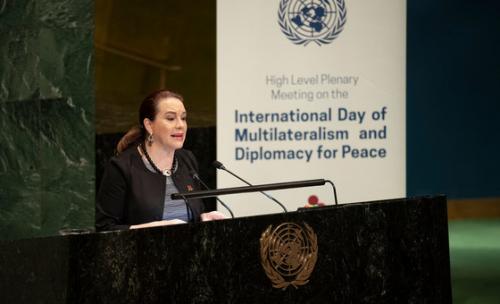Multilateralism’s ‘proven record of service’ is focus of first-ever International Day
The International Day of Multilateralism and Diplomacy for Peace “underscores the value of international cooperation for the common good”, according to United Nations Secretary-General António Guterres marking its first-ever observance on Wednesday.

María Fernanda Espinosa Garcés, President of the seventy-third session of the General Assembly, addresses the General Assembly meeting to commemorate and promote the International Day of Multilateralism and Diplomacy for Peace.
The UN chief pointed out that for nearly 75 years, multilateral arrangements established after the Second World War have “saved lives, expanded economic and social progress, upheld human rights and, not least, helped to prevent a third descent into global conflagration”.
Citing international law, the advancement of gender equality, environmental protection and limiting the proliferation of lethal weapons and deadly disease, he said that “multilateralism and diplomacy have a proven record of service to people everywhere”.
As multilateralism and international cooperation are underpinned in the UN Charter and the 2030 Agenda for Sustainable Development it is fundamental to preserve their values to promote and support the three pillars of the UN, namely peace and security, development and human rights.
Today however, multilateralism is under pressure from “unresolved conflicts, runaway climate change, widening inequalities and other threats,” lamented the UN chief, adding that while new technologies are creating opportunities, they can potentially disrupt “job markets, social cohesion and the enjoyment of our rights”.
“We are living with a paradox: Global challenges are more connected, but our responses are growing more fragmented”, he summarized.
Mr. Guterres said that an increasing “deficit of trust” in governments, political establishments and international organizations, along with nationalist and populist voices that “demonize and divide” were “very dangerous”, adding that “collective action is essential” in facing today’s challenges.
Recalling the urgency of the UN founders, he maintained the need to “reinvigorate the Organization’s tools”.
“The principles of working together endure, but the specifics must take account of our rapidly changing world”, Mr. Guterres said.
He maintained the need to strengthen commitment to a rules-based order, with an effective UN.
“We need a networked multilateralism, with close cooperation among international and regional organizations” detailed the UN chief, one “rooted in partnerships with the business community, civil society, parliaments, the academic and philanthropic communities and other stakeholders, in particular young people”.
He underscored that proclaiming the virtue of multilateralism is not enough, “we must prove its added value”, nor can doubters be dismissed, but instead “we must show that multilateralism can respond to global anxieties and deliver a fair globalization that lifts all”.
“Strengthening multilateralism means strengthening our commitment to achieving the Sustainable Development Goals (SDGs) and building a safer, more just world for future generations", according to the UN chief.
“That commitment is needed now more than ever – from the United Nations and from leaders and citizens everywhere”, concluded the Secretary-General.
‘Tip the balance’ right
The Day was commemorated with a high-level meeting in the General Assembly Hall in which President Maria Fernanda Espinosa, in her opening statement, echoed the Secretary-General by outlining the on-going challenges to multilateralism. She stressed that to rebuild confidence in multilateralism we cannot “exclude those for whom we work, those who, together with us, can provide solutions and undertake commitments”.
"Bringing the UN closer to people, and people to the UN" can only be achieved if we better communicate with those “outside this building”.
She went on to highlight the legacy of multilateralism and peace diplomacy, noting the UN’s contributions in making the world “a safer, healthier, fairer place with greater opportunities for all”.
Ms. Espinosa emphasized the need to end the “false idea” that multilateralism undermines States’ sovereignty, “when in reality, it reinforces it”.
“To achieve and sustain peace and sustainable development, multilateralism is not only the most efficient way, but the only possible way”, she spelled out.
She said that last year’s General Debate confirmed that “most of the world's leaders share this vision”, adding that “we have achieved a lot, but we still have a long way to go”.
Ms. Espinosa made a call to action for a revitalized stronger Organization to bolster confidence in multilateralism.
“From now on, each year 24 April will provide an opportunity to evaluate the Organization’s contribution to humanity”, she said.
To better do this, the General Assembly Pres affirmed that it is “essential” to have a more effective, transparent and agile UN as well as a more equitable international order.
Source:United Nations
- 217 reads
Human Rights
Ringing FOWPAL’s Peace Bell for the World:Nobel Peace Prize Laureates’ Visions and Actions

Protecting the World’s Cultural Diversity for a Sustainable Future

The Peace Bell Resonates at the 27th Eurasian Economic Summit

Declaration of World Day of the Power of Hope Endorsed by People in 158 Nations

Puppet Show I International Friendship Day 2020

